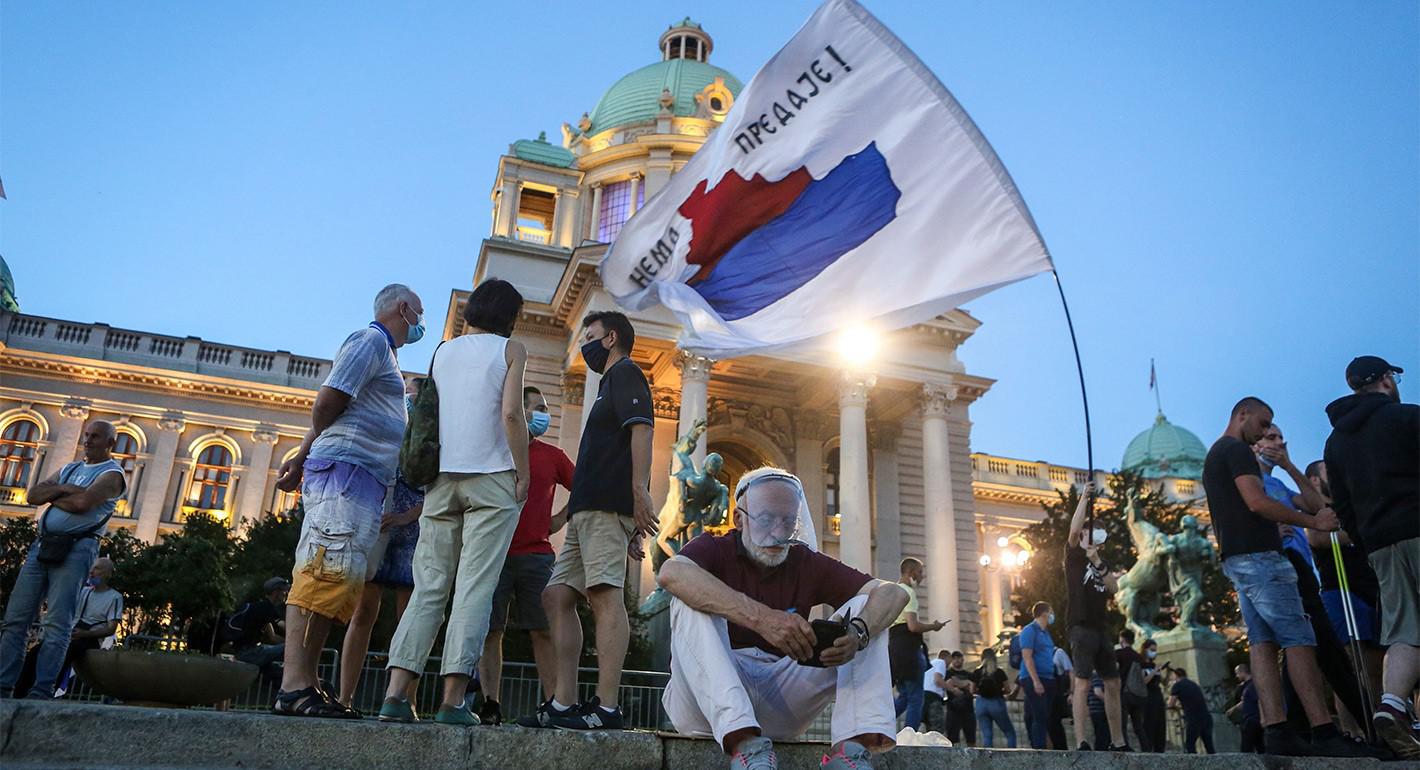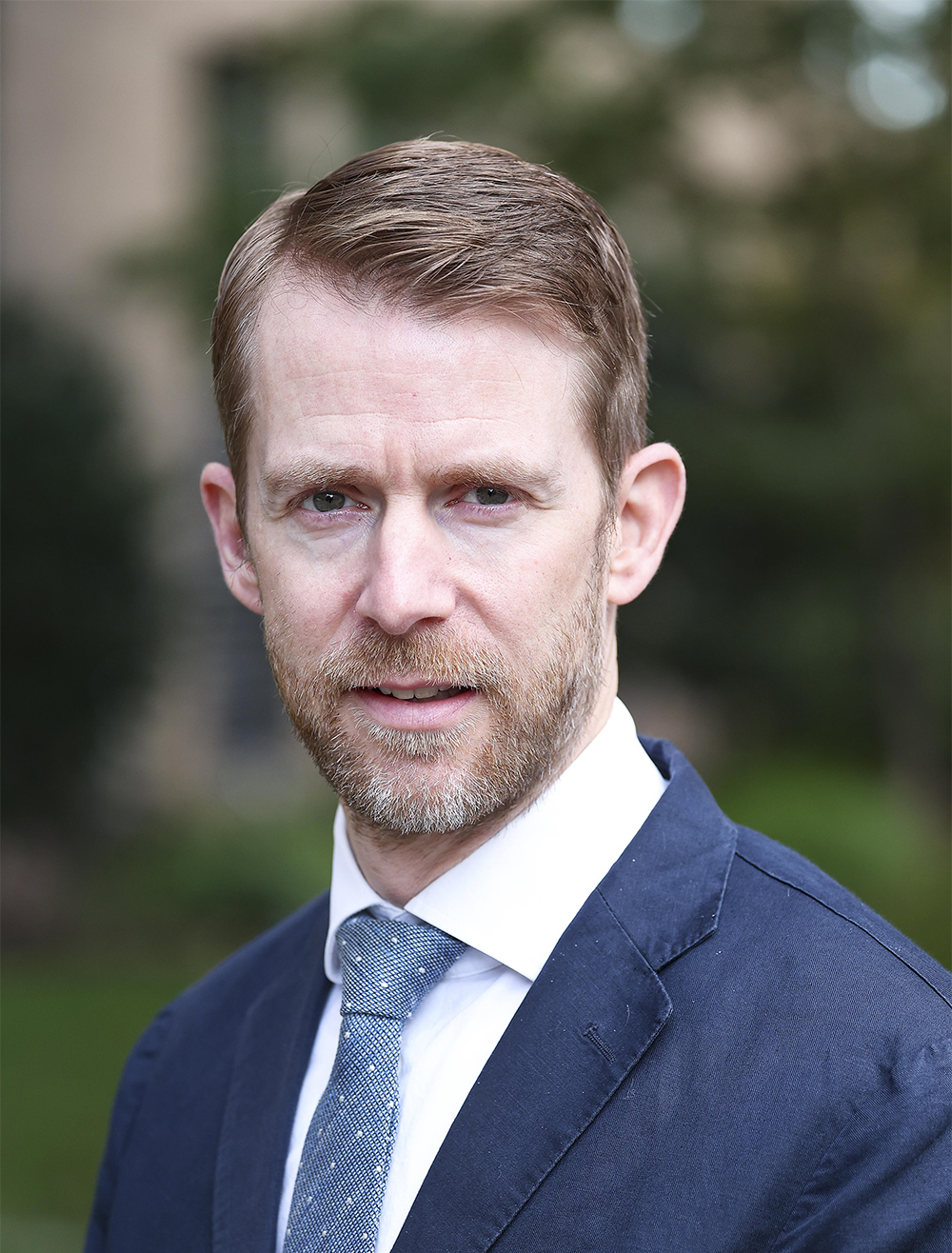Supporters of democracy within and outside the continent should track these four patterns in the coming year.
Saskia Brechenmacher, Frances Z. Brown
{
"authors": [
"Maksim Samorukov"
],
"type": "legacyinthemedia",
"centerAffiliationAll": "",
"centers": [
"Carnegie Endowment for International Peace",
"Carnegie Russia Eurasia Center"
],
"collections": [],
"englishNewsletterAll": "",
"nonEnglishNewsletterAll": "",
"primaryCenter": "Carnegie Endowment for International Peace",
"programAffiliation": "",
"programs": [],
"projects": [],
"regions": [],
"topics": []
}
Serbia’s authorities broke an old taboo when they blamed pro-Russian radicals for instigating some of the recent violence in the country, and Russia-Serbia relations may never be the same again.
Source: Balkan Insight
In the past week, Serbia made global headlines as one of the first countries to find itself in political turmoil due to the COVID-19 pandemic. On July 7, thousands of Serbs took to the streets, protesting against the re-imposition of lockdown restrictions. The protests continued for several days with outbursts of violence in which dozens of people were injured, and even including an attempt to storm parliament.
The unrest took place just days before the long-awaited resumption of talks between Kosovo and Serbia, giving rise to suspicions that provocateurs might have infiltrated the protests.
Many observers accused Russia of stirring up more trouble in the Balkans: Moscow is seen as an opponent of the resolution of the Kosovo issue, which would likely ease the Euro-Atlantic integration of Russia’s long-time ally.
No evidence of Russia’s direct involvement in events in Serbia has been shown, but, regardless, the protests have already brought about changes to Russia-Serbia relations.
Serbs had plenty of reasons to feel annoyed about the way their government had handled the pandemic. After two months of strict lockdown measures, most of the restrictions were lifted in May ahead of parliamentary elections. A significant proportion of the opposition boycotted the vote, allowing the ruling Serbian Progressive Party, led by President Aleksandar Vucic, to score a landslide victory.
Only days later, the authorities reported an upsurge in the number of new COVID-19 cases and tried to re-impose most of the restrictions. In response, many accused Vucic and his party of knowingly endangering people’s lives in order to hold the vote and secure a loyal parliament.
Still, the high number of violent incidents and provocations in the initially peaceful protests suggests that the public discontent was manipulated.
The Serbian authorities have named pro-Russian radicals among the main troublemakers – an unprecedented accusation in the traditionally friendly Russia-Serbia relationship.
In the past, Vucic attempted to tailor his narratives about protests against his government to his audience. On visits to the Kremlin, he would describe protests against his increasingly authoritarian rule as an attempted “colour revolution”, referencing the pro-Western uprisings seen in several countries of the former Soviet Union, fomented by pro-Western oppositions.
In Western capitals, Vucic would speak about the same protesters as chauvinists and ultranationalists trying to undermine his efforts to bring Serbia closer to the West. The broader Serbian public was meanwhile kept in the dark about these mutually exclusive narratives that their leader presented to the country’s external partners.
This time, things are different. Though Vucic himself has stopped short of directly accusing Russia of sponsoring the protests, Serbian officials and the pro-Vucic media have not minced their words, portraying the protesters as pro-Russian nationalists trying to thwart the upcoming Kosovo talks.
A long-standing taboo has been broken. For decades, Russia’s popularity in Serbia was largely based on flattering coverage in the local media and unconditional praise from Serbian bureaucrats. Now it turns out that they are prepared to present Russia as a hostile power, at least in some instances.
The number of these instances is bound to increase as Vucic inevitably comes under pressure during the Kosovo talks. Citing the threat of nationalist riots and a Russian takeover in Serbia may be the easiest way for him to bolster his position vis-à-vis Pristina, and persuade the West to take a more lenient stance towards Belgrade.
Meanwhile, Russia’s numerous interactions with various groups of Serbian nationalists will provide Vucic with ample evidence to make his case.
Russia’s once untouchable image with the Serbian public may find itself in a downward spiral when increasingly lukewarm treatment by the local media undercuts the demand among Serbian politicians for photo-ops with Russian dignitaries. That will in turn further decrease the electoral costs of criticizing the once sacrosanct Kremlin.
These dynamics may dovetail with the developments in another key area of Russia-Serbia relations: the energy sector.
Emboldened by his party’s landslide victory in the recent elections, Vucic has apparently decided that the political alliance with his long-time junior partner, the Socialist Party of Serbia, has outlived its usefulness.
The Socialists have been loyal members of the ruling coalition with Vucic’s party since 2012. They steered clear of criticizing the President, taking their share of lucrative posts in public companies in exchange.
This time, coalition talks between the two partners have hit some turbulence. Vucic pressured the Socialists to carry out a thorough purge of the party leadership, threatening to leave them out of the new government if they did not oblige. The protests provided a convenient pretext for a purge, as police detained aides and relatives of a few leading party cadres during the disturbances.
The Socialists’ ties with Moscow date back to the times of former Serbian president Slobodan Milosevic. The party leader, Ivica Dacic, Foreign Minister since 2014, is widely seen as a pro-Russian counterweight to Vucic’s more pro-Western inclinations. Less public but no less important is another Socialist, Dusan Bajatovic, who has been in charge of Serbian gas giant Srbijagas since 2008.
The Socialists’ management of the gas industry has ensured that Serbia has remained one of the most loyal and undemanding clients of Russia’s energy giant, Gazprom. Serbia imports gas exclusively from Russia, pays one of the highest prices for it in the region, and there has been little talk of diversification until recently. The import process is also non-transparent and regulated by inflexible decade-long agreements.
The size of the rents generated by Russia-Serbia gas trade is difficult to determine, but they are in for a major redistribution if Vucic succeeds in cutting the Socialist Party down to size.
Gazprom’s old partner, Petar Skundric, Serbia’s energy minister from 2008-11, has already lost his position as Dacic’s adviser on energy issues, following his son’s arrest at a protest rally.
Bajatovic also appears to be on the way out, having been repeatedly criticized by the pro-Vucic tabloids during the past few months. On July 13, Socialist Party Vice-President Novica Toncev tellingly threatened to have the protesters block the Belgrade-Skopje highway if any Socialist CEOs were removed from their posts. The threat was later disavowed and condemned by the party leadership – but it demonstrated how precarious Bajatovic’s position had become.
The reasons for Moscow’s displeasure with Vucic are multiplying almost daily, and the Kosovo talks, with their geopolitical implications, are only part of the story.
In the few weeks that have passed since the elections, Vucic has challenged the decade-old status quo in all major spheres of Russia-Serbia cooperation. Given both sides’ penchant for unconventional measures, it is too early to call the winner. But relations between the two countries will never be the same.
Carnegie does not take institutional positions on public policy issues; the views represented herein are those of the author(s) and do not necessarily reflect the views of Carnegie, its staff, or its trustees.
Supporters of democracy within and outside the continent should track these four patterns in the coming year.


Saskia Brechenmacher, Frances Z. Brown
On January 12, 2026, India's "workhorse," the Polar Satellite Launch Vehicle, experienced a consecutive mission failure for the first time in its history. This commentary explores the implications of this incident on India’s space sector and how India can effectively address issues stemming from the incident.

Tejas Bharadwaj
Is Morocco’s migration policy protecting Sub-Saharan African migrants or managing them for political and security ends? This article unpacks the gaps, the risks, and the paths toward real rights-based integration.
Soufiane Elgoumri
In return for a trade deal and the release of political prisoners, the United States has lifted sanctions on Belarus, breaking the previous Western policy consensus. Should Europeans follow suit, using their leverage to extract concessions from Lukashenko, or continue to isolate a key Kremlin ally?

Thomas de Waal, ed.
As states without nuclear weapons develop nuclear-powered submarines, can NWFZ regimes adapt to manage new technical, legal, procedural, and normative challenges?


Jamie Kwong, ed., Toby Dalton, ed., Celia McDowall, ed.